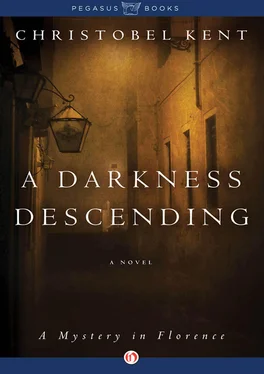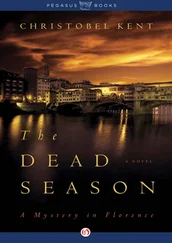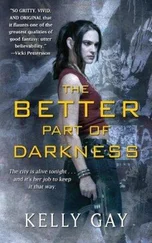Christobel Kent - A Darkness Descending
Здесь есть возможность читать онлайн «Christobel Kent - A Darkness Descending» весь текст электронной книги совершенно бесплатно (целиком полную версию без сокращений). В некоторых случаях можно слушать аудио, скачать через торрент в формате fb2 и присутствует краткое содержание. Год выпуска: 2013, ISBN: 2013, Издательство: Corvus, Жанр: Криминальный детектив, на английском языке. Описание произведения, (предисловие) а так же отзывы посетителей доступны на портале библиотеки ЛибКат.
- Название:A Darkness Descending
- Автор:
- Издательство:Corvus
- Жанр:
- Год:2013
- ISBN:9780857893260
- Рейтинг книги:5 / 5. Голосов: 1
-
Избранное:Добавить в избранное
- Отзывы:
-
Ваша оценка:
- 100
- 1
- 2
- 3
- 4
- 5
A Darkness Descending: краткое содержание, описание и аннотация
Предлагаем к чтению аннотацию, описание, краткое содержание или предисловие (зависит от того, что написал сам автор книги «A Darkness Descending»). Если вы не нашли необходимую информацию о книге — напишите в комментариях, мы постараемся отыскать её.
A Darkness Descending — читать онлайн бесплатно полную книгу (весь текст) целиком
Ниже представлен текст книги, разбитый по страницам. Система сохранения места последней прочитанной страницы, позволяет с удобством читать онлайн бесплатно книгу «A Darkness Descending», без необходимости каждый раз заново искать на чём Вы остановились. Поставьте закладку, и сможете в любой момент перейти на страницу, на которой закончили чтение.
Интервал:
Закладка:
And then she spoke. ‘You don’t know what it was like,’ she said, her voice cracking, the fervour gone, and with a relief he dared not show Sandro knew he still had her.
‘To see him go down like that.’ Her eyes were wide at the memory. ‘Keel over, like he’d been shot, or poisoned. And I saw it coming, you know? Had like a — a premonition. It seemed like — like all those assassinations: we really thought that’s what it was. It means something, Sandro, I just don’t know what, yet.’ And he could see that she was holding her hands together tight so that he wouldn’t see that she was shaking.
‘All right,’ he said. ‘All right. We’ll see if we can get to the bottom of it, shall we? We’ll see what we can do.’
And for now the insurance claim and the briefcase and even the second cup of coffee receded beyond hope of return.
‘We start with the college friend,’ he said. ‘The lawyer.’
*
In the cafe opposite the post office — where she had just dropped off a parcel — Luisa stood at the red marble bar and hoped it was going to be all right. The kind of involuntary thought she tried, actually, not to have: Luisa preferred to take the position that it would be all right. One doubter and fretter in the family — if you could call it a family — was enough. Slowly she stirred the coffee that sat in front of her on the bar, saw the barman glance over.
And what exactly did she hope was going to be all right? Well, a number of things, that was the trouble. One problem at a time, then. Fine.
Sandro would forget that it was her annual check-up next week, she was pretty sure of that.
It didn’t worry her. It wasn’t the check-up, it hadn’t even been the breast cancer itself, when it came, that frightened her, only what came with it. The look on other people’s faces was what it boiled down to. Even three years later there was still the ghost of that look. Furtive, guilty, evasive.
If truth be told, Luisa rather hoped Sandro had forgotten about the check-up, because she’d prefer to slip off there on her own without having to look into his anxious face in the waiting room. She remembered last time. His expression when she came out of the cubicle in the backless gown, as if she was already in her shroud: after that she hadn’t let him in for the mammogram for fear he’d faint dead away. It didn’t count as an invasive procedure but it sure enough felt like one, and looked like one, being cranked and squeezed and manhandled into a machine.
‘Signora?’ The barman was peering into Luisa’s face with concern: she must have been grimacing. Did he know? She couldn’t remember if he knew about her missing breast, this young man who served her coffee a few times a week. He probably did. Sometimes it seemed to Luisa that everyone in Florence knew, and it irritated her. She raised the coffee hastily to her lips. It had gone quite cold, but it was still good. She gave the barman an imperious look.
Dairy products were bad for you: so was coffee, so was wine. Luisa had never smoked, although both of her parents had; she must have absorbed more nicotine than a fly-paper as a kid. She had pored over the risk factors and causes, and had emerged none the wiser. It had made Sandro angry to see her frowning, and refusing a glass of wine: ‘What’s the point?’ he’d say. Not like you can go back and change it now. And even if you could, Luisa had concluded after a month or so of useless fretting, perhaps you wouldn’t. Life is for living, for tasting the things you like to taste. And it seemed to Luisa that even if it meant living five, ten years longer, it wouldn’t be worth losing sight of what brought pleasure.
Outside a beggar stood on the steps of the post office. He swivelled to follow each customer in and out, his cap held before him, and she could see his mouth murmur those few words. Uno spicciolo per mangiare. Quite a respectable-looking beggar: white moustache, dark wool jacket shiny at the elbows, baggy serge trousers. An old-fashioned sort of beggar, deferential and formal. She could see he was quite successful; people responded to tradition. Meanwhile, at the other end of the arcade the Roma women would be working their pitch, long braids swinging, often a baby held across the body carelessly in a sling of flowered fabric. Luisa, who had no children although she had given birth once long ago, to a girl who died two days later, set her face against these women even if she knew, at bottom, that they — and their babies — probably needed her pity. Needed her loose change more.
Luisa’s mother had given to beggars, as a protective measure, a superstition. Luisa took out her purse and looked in it, fingered a two-euro coin and put it in the pocket of her jacket. She would not do it out of superstition, though.
So what else did she hope would be all right, if not the damned check-up? Well, that first, get it out of the way. The bus to Careggi, the stuffy waiting room, the gown and the examination. She could get through that just planning what she would cook for dinner and, at a pinch, what she would wear to work the following day: her own perfectly well-regulated strategies.
On the small high table beside Luisa was a newspaper. Not thinking, she turned it towards her, stared at the headline without registering what it said.
That morning she had arrived at the shop half an hour early, as she often did: she had gone into the stock room where there was a small mirror, removed her blouse and her slip and her brassiere, and looked at herself.
Why she could not do this at home she didn’t know. On one side a round breast, well proportioned, slightly low under the weight of years and gravity but a good shape. On the other side a curved and puckered scar, faded now to silvery-white. It had been first an angry red, purplish, and a rash had come and gone.
They would ask her again about reconstruction, next week. Luisa didn’t know what she would say: even the question seemed an intrusion too far. She had stood there perhaps two, three minutes, looking at herself. She’d caught her own stern expression as she put the bra back on. Sandro did not discuss it: he gave no sign, in fact, of ever having noticed that her body was any different, although to Luisa it was as different as if she had had her leg removed. They did not mention it. Perhaps they would never have to. She told herself the thought should be reassuring, but somehow it was not.
Now in front of the window in the Caffe della Posta, Luisa looked away from the newspaper and down at herself. The place was crowded, no one was watching her, but she didn’t much care anyway. The blouse was loose, so you couldn’t tell, unless you were really looking. And who really looked at a woman in her sixties? In a sweater she could tell: the prosthesis sometimes slipped a little. But who looked? Quickly Luisa shifted her gaze aside, back to the newspaper: she unfolded it in a pretence of reading to distract herself.
She should get back: half an hour to post a parcel was more than enough. They gave her leeway, since — but she didn’t want leeway.
‘ROSSELLI COLLAPSES’. She frowned at the headline and as she did so the hum of conversation in the bar behind her sharpened, voices became distinct. This was what they were talking about. The tone of the newspaper article, like the conversation, was snide and hostile.
‘I heard, drugs,’ said a woman’s unpleasant, needling voice. Luisa didn’t need to see her to know what kind of woman she was: Luisa could have told you where she got her hair set without turning round.
‘Oltrarno do-gooders, that green nonsense. They’re all lowlife. Drugs. And they’re telling us they’re above taking backhanders?’ The man spoke automatically: her husband, her lover, whatever, placidly agreeing with everything she said. They lived in a ground-floor apartment in Le Cure, with a garden — they complained about the mosquitoes; they had his mother’s expensive silver and a house in Porto Ercole for the summer months. They complained about how much it all cost, they both fiddled their taxes and they both cheated on each other.
Читать дальшеИнтервал:
Закладка:
Похожие книги на «A Darkness Descending»
Представляем Вашему вниманию похожие книги на «A Darkness Descending» списком для выбора. Мы отобрали схожую по названию и смыслу литературу в надежде предоставить читателям больше вариантов отыскать новые, интересные, ещё непрочитанные произведения.
Обсуждение, отзывы о книге «A Darkness Descending» и просто собственные мнения читателей. Оставьте ваши комментарии, напишите, что Вы думаете о произведении, его смысле или главных героях. Укажите что конкретно понравилось, а что нет, и почему Вы так считаете.












